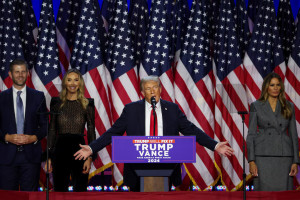Columns
Algorithmocracy: What the future may hold
Artificial intelligence is changing society, for better or for worse, but Nepal is lagging behind..jpg&w=900&height=601)
Bimal Pratap Shah
Democracy has sometimes been hailed as a panacea to all the ills the world is suffering from. But, in the second decade of this millennium, things did not look that favourable for the democratic process, mainly because many people lost faith in democracy. People’s participation in the electoral process decreased considerably. The lower voter turnout and people’s declining trust towards liberal governments, however, are the least of democracy’s problems. The biggest threat to the political order will come from disruptive digital technologies, unless it is used to the system’s advantage.
The current political leadership in Nepal is clueless about the coming future. Until now, they have overlooked the importance of effectively managing digital technologies that are poised to disrupt many of the foundational ideas of democracy, specifically artificial intelligence (AI). AI refers to systems that display intelligent behaviour by analysing their environment and taking actions with some degree of autonomy to achieve specific goals. AI can also be defined as a simulation of human intelligence by machines.
The Nepali government seems to be confident about the possibility of devising policies to manage AI in due course of time. The effects of new technologies unfolded relatively slowly in the past, allowing former governments enough time to adjust. This time though, the policymakers are mistaken. The pace of the AI revolution will be much faster and will further accelerate over time.
The use of AI in politics brings new opportunities as well as poses various challenges to the democratic process. Politicians usually design the election agenda that they thought would best serve the interests of the constituency. This created a huge design-reality gap that made citizens more dissatisfied with democracy. Modern-day tech-savvy politicians have already started using AI to study the electorate’s views to adjust their campaign strategies.
Such politicians are using AI to analyse data about voters’ preferences by studying their social media activities. This could be a good thing if politicians increase communication with the voters. This could be a threat as well. For example, in most cases, the illiterate voters do not know what is good for them and are only interested in short term gains, thus democratic elections could end up becoming mass appeals instead of the reasoned deliberation process that has until now benefited society as a whole.
Political advertising provides politicians with tools that enable them to manipulate citizens by using smartly designed algorithms. The tool can also be used to study individual opinions and nudge undecided voters towards the side that invests more in machine learning strategies. The reasons for this shift are complex, but appear to be AI-related. Politicians and governments are using AI to manipulate people.
Another large threat to democracy could come from the AI industry dominated by a few tech giants. Google, Microsoft, Amazon, Facebook, IBM, Apple, Baidu, Alibaba, and Tencent already lead AI development. Furthermore, these tech giants are developing the frameworks, chipsets and networks that underpin the communication infrastructure of the modern world. They are also funding the majority of research and earning the lion’s share of patents. Above all, these companies are not transparent.
The Chinese government, meanwhile, is pumping huge sums of money into AI research as part of a strategy developed in 2017. In the US, the private sector traditionally funded AI research, but now the US is following in the footsteps of China. Earlier this month, the White House announced that it is pumping hundreds of millions more dollars into AI research. The administration is planning to boost funding for AI research at the Defense Advanced Research Projects Agency (DARPA), the National Science Foundation, the Department of Energy and the Department of Agriculture.
The Chinese government’s development strategies have already proven to be effective. Between 2016 and 2018, Chinese companies filed more AI-related patents than their US counterparts. According to a recent study conducted by Nikkei, in 2018 alone the northern neighbour was responsible for 30,000 new patent filings related to artificial intelligence. This is because private AI companies in China leverage strategic support from the government to form the collaborative networking necessary for AI innovation.
There are many things the government here in Nepal can learn from the Chinese government in promoting AI in the country. Yet, It is unlikely that we will see any efforts from the government’s side to create an effective strategy. This is because the political leaders’ thought process and ideology are still stuck in the 19th century.
Meanwhile, artificial intelligence continues to rise in importance. It has also become an important tool in the fight against disease outbreak. Insilico Medicine, a startup based in the US, used AI to rapidly identify molecules that could form the basis of an effective treatment against the current Coronavirus outbreak. The AI-based system took only four days to identify thousands of new molecules that could be turned into potential medicines against the virus.
Artificial intelligence can provide society with many benefits, if regulated and used responsibly. Elected representatives cannot afford to ignore this technology any longer. The government’s role will always be pivotal to using such technology to benefit democracy.
***
What do you think?
Dear reader, we’d like to hear from you. We regularly publish letters to the editor on contemporary issues or direct responses to something the Post has recently published. Please send your letters to [email protected] with "Letter to the Editor" in the subject line. Please include your name, location, and a contact address so one of our editors can reach out to you.




 22.12°C Kathmandu
22.12°C Kathmandu














